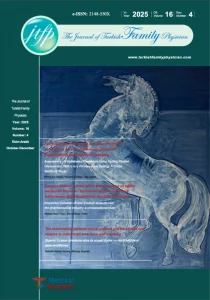The examination of the relationships between COVID-19 phobia, loneliness, and depression during the postpartum period
Introduction and Aim: In the postpartum period, mental disorders may occur in some women due to reasons such as increased responsibilities, social isolation, and restriction of freedom. The aim of this study is to investigate the relationship between COVID-19 phobia, depression and loneliness in postpartum women with 4-8 week old babies who apply to primary care.
Methods: The population of this study, which is a cross-sectional analytical study, consists of women who applied to primary care and 4-8 weeks after giving birth. Mothers who applied to a total of 6 family health centers selected from the three central districts of Konya between 01.06.2021 and 01.09.2021, when the pandemic was intense, were included in the study. The data of the study were collected with the sociodemographic information form, Edinburgh Postpartum Depression Scale (EPDS), COVID-19 Phobia Scale and UCLA Loneliness Scale.
Results: 425 mothers who met the inclusion criteria participated in the study. The average age of the mothers was 28.57±4.59 (min=18; max=42) years. 56.4% (n=240) of the participants were university graduates, 48.5% (n=206) were working before birth. The income of 55.3% (n= 235) of the participants was equal to their expenses, 95.1% lived in the city center, the last pregnancy of 88.2% (n=375) was a desired pregnancy and 22.0% ( n=94) did not receive any help with baby care. The frequency of participants who had COVID-19 was 34.6% (n = 147). A strong positive correlation was detected between participants’ EPDS scores and UCLA Loneliness Scale scores (r=0.615, p<0.001). There was a moderate positive correlation with the COVID-19 Phobia Scale score and the EPDS score (r=0.300, p<0.001), and a low positive correlation with the UCLA loneliness scale score (r=0.150, p=0.002).
Conclusion: In the presented study, it was determined that approximately one quarter of the participants had symptoms of postpartum depression, and as the level of COVID-19 phobia increased, both the risk of postpartum depression and the feeling of loneliness in mothers increased. Especially in extraordinary situations such as pandemics, where isolation is required, questioning the loneliness of mothers in the postpartum period and evaluating them psychosocially becomes even more important.



